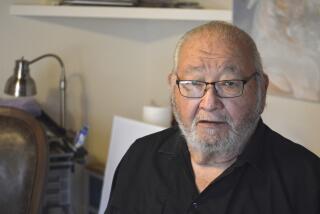Song of the Sky:<i> Versions of Native American Songs & Poems</i> b<i> y Brian Swann; foreword by Paula Gunn Allen (Four Zoas Night House: $12.50; 147 pp.) </i>
- Share via
“Do you picture it,” a Zuni once asked the ethnographer Dennis Tedlock transcribing American Indian oral verse, “or do you just write it down?” Whether a reader sees-through-words seems a question for all poetries of all peoples, from calligraphy and pictograph to measured or free verse. Brian Swann, the English-born poet and translator educated at Cambridge and Princeton, now professor at Cooper Union, shows us shaped native poems, reworked from the original texts of 17 pioneering ethnologists.
Swann offers musical contexts--reproducing some of the musical notations--for such texts and focuses his attention on the play of poetic form. Excising repetitions and vocables, he arranges these song-poems visually on the page with a sense of acoustic canvas, or the “signs” of sounds ceremonially performed. “The poem’s form,” H. S. McAllister has offered, “is the sound it makes when spoken.” We “see” this played out in “Song of the Sky.” Round dance songs come round typographically; spirit songs soar up the page and circle; hunting songs step carefully; planting songs open the verbal ground traversed.
In 1929, D. Dematracapoulou heard a Northern California Wintu shaman, Jim Thomas, sing. Swann’s adaptation pictures the Wintu dancing:
The spirits of people will rise above swaying like women while men dance, swaying with dandelion puffs in their hands.
These dancing words ideogrammatically improvise the “song” of the poem; their lyric overtones--indeed, their woven cultural harmonics--can be seen/heard in the graphic designs.
As Swann quickly concedes, these shaped translations are but “shadows of shadows,” that is, transcriptions in a second tongue without the performing tribal contexts, let alone original music and ritual. Swann’s “re-expressions” of older translations are formally improvisational, as with Jerome Rothenberg’s “Shaking the Pumpkin” (1972), and poetically inventive, as with William Brandon’s “The Magic World” (1971), yet judiciously experimental and responsible to the sources. “Song of the Sky” is not so much translation, or even retranslation--as today with the linguistic anthropology of William Bright, Dell Hymes, Dennis Tedlock, Paul Zolbrod, and others--but experimental presentations at the far end of what Tedlock calls “ethnopaleography,” or the ethnic archeology of cultural texts (“The Spoken Word and the Work of Interpretation,” 1983). At this end we reconstruct sacred texts from fragments of tribal context, complex language patterns outside EuroAmerican history, cultural palimpsests over 40,000 years native to America, and intricate oral traditions still very much alive. At the other end seers sing for power to bind and heal and renew their peoples.
Kenneth Rexroth once spoke of this “numinous” quality of words in Native American culture as “sacramental,” and he found nothing so magical in EuroAmerican literature. Just so, a decade ago in Munich, the Nobel Prize novelist, Elias Canetti, confessed there is “hardly anything that fills us with as much hope as these early incomparable creations” (“The Conscience of Words,” 1979). “One cannot thank scholarship enough for rescuing it; its true preservation, its resurrections to our life are up to the poet, the Dichter .” Swann is such a poet-scholar, publishing more than two dozen creative and critical works so far, not the least a collection of the leading essays on traditional Native American literature, “Smoothing the Ground” (University of California Press, 1983--sequel forthcoming in 1987).
In his 70s, Geronimo, the Chiricahua Apache, a legendary singer of power, drew a “holy song” for Natalie Curtis that pictured his transformation into spirit. “I am surrounded by little clouds, and as I go through the air, I change, becoming spirit only.” Geronimo then sang, Curtis transcribed and translated, and a century later Swann (re)images the shamanic song:
little cloud me through the air as I move changing I go to a sacred placethis is the way going up
More to Read
Sign up for our Book Club newsletter
Get the latest news, events and more from the Los Angeles Times Book Club, and help us get L.A. reading and talking.
You may occasionally receive promotional content from the Los Angeles Times.










